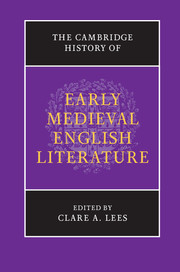Book contents
- Frontmatter
- Contents
- List of Illustrations
- List of Contributors
- Acknowledgements
- List of Abbreviations
- Introduction: literature in Britain and Ireland to 1150
- I WORD, SCRIPT AND IMAGE
- II EARLY ENGLISH LITERATURE
- III LATIN LEARNING AND THE LITERARY VERNACULARS
- 19 In measure, and number, and weight: writing science
- 20 Legal documentation and the practice of English law
- 21 Latinities, 893–1143
- 22 The authority of English, 900–1150
- 23 Crossing the language divide: Anglo-Scandinavian language and literature
- 24 European literature and eleventh-century England
- 25 Gaelic literature in Ireland and Scotland, 900–1150
- 26 Writing in Welsh to 1150: (re)creating the past, shaping the future
- Bibliography
- Index of manuscripts
- Index
22 - The authority of English, 900–1150
from III - LATIN LEARNING AND THE LITERARY VERNACULARS
Published online by Cambridge University Press: 05 February 2013
- Frontmatter
- Contents
- List of Illustrations
- List of Contributors
- Acknowledgements
- List of Abbreviations
- Introduction: literature in Britain and Ireland to 1150
- I WORD, SCRIPT AND IMAGE
- II EARLY ENGLISH LITERATURE
- III LATIN LEARNING AND THE LITERARY VERNACULARS
- 19 In measure, and number, and weight: writing science
- 20 Legal documentation and the practice of English law
- 21 Latinities, 893–1143
- 22 The authority of English, 900–1150
- 23 Crossing the language divide: Anglo-Scandinavian language and literature
- 24 European literature and eleventh-century England
- 25 Gaelic literature in Ireland and Scotland, 900–1150
- 26 Writing in Welsh to 1150: (re)creating the past, shaping the future
- Bibliography
- Index of manuscripts
- Index
Summary
The well-known educational reforms instigated by King Alfred in the 890s established the cultural and intellectual value of English at a time when no other vernacular language had attained such centrally authorized validity. The impact of these reforms was immediate, inasmuch as a number of notable classical and patristic texts were translated into English, the Anglo-Saxon Chronicle was initiated on a formal footing, and freemen were encouraged to acquire an education in English. From the first half of the tenth century, even though the endurance of these reforms seems to have been tenuous at times, numerous English and Latin literary manuscripts and administrative documents survive, including vernacular witnesses to the works emphasized by Alfred as ‘most necessary for all men to know’: the Anglo-Saxon Chronicle, copies of Bede’s Historia ecclesiastica, Boethius’ Consolation of Philosophy and Orosius’ Historiae adversum paganos. By the end of the tenth century, these beginnings had flourished into a sizeable corpus of English poetry and prose such that the legacy of Alfred was assured by those who knowingly followed in his footsteps.
Authority i: the testimony of English
By the early decades of the eleventh century, so vibrant and confident was the use of English that its promise as the language of record resulted in the copying of the four major poetic codices capturing and making permanent the long history of vernacular verse, as discussed in Chapters 11 and 16 above. The writing down of a literary tradition that had previously been predominantly oral shows clearly that English as a written medium was understood by the manuscript compilers and scribes to have longevity, to have weight and authority. This gravitas is confirmed by the occurrence in the Anglo-Saxon Chronicle of poetry celebrating and commemorating English kings, and by the inclusion in Cambridge, Corpus Christi College, MS 201 of not just homilies, laws and ecclesiastical regulations, but of religious poetry too.
- Type
- Chapter
- Information
- The Cambridge History of Early Medieval English Literature , pp. 554 - 578Publisher: Cambridge University PressPrint publication year: 2012
- 1
- Cited by

